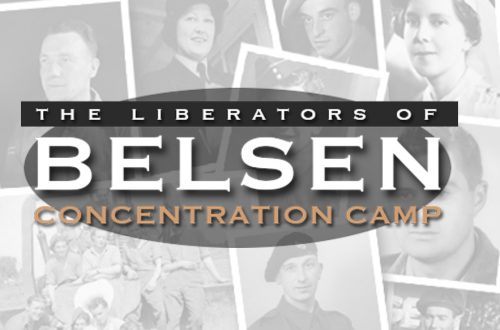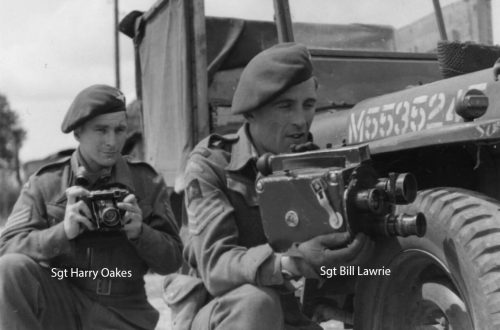75th Anniversary Press – Ken Knight
Ken Knight was one of the first men through the gates. He spoke movingly about the experience to the Dorset Echo in 2003. Here we re-publish the interview with Ken who passed away in 2007.
ON a bright April day in 1945, Ken Knight walked through the gates of hell.
As a committed Christian it was an experience he had hardly contemplated realising in the hereafter, let alone as a young man in the prime of life. He was met by the diseased and the dying, the skeletal frames of proud people persecuted simply because their birthright has been viewed as an inalienable wrong in the eyes of others.
There were also the innumerable dead; those too weak, too starved, too dispirited to carry on clinging to what now passed as an excuse for life.
It was, in the stark, echoing words of Ken: “The product of man’s ultimate inhumanity to his fellow man.”
The gates he walked through on that inappropriately pleasant spring day were those of Bergen-Belsen, the notorious Nazi Second World War concentration camp, reviled and remembered by everyone except, undoubtedly, the perpetrators of the evil it spawned and their apologists, as hell on earth.
“What I remember most when I walked through the gates were just three simple words,” recalls Ken.
“They were “Ich habe kranke”, and they were the most understated yet harrowing words I have ever heard.”
Those words mean simply “I am sick”, and they were uttered repeatedly by people who stared with dull, lifeless eyes at those who had come to free them from the savage oppression of the Nazi regime. There were tens of thousands of people in the camp; about 10,000 were dead and the rest in various stages of deterioration.
“I can never forget the stench, the bodies, the despair. Many of the living were naked, begging for food and just murmuring, “Ich habe kranke”.
“Yet they were so ill we just couldn’t feed them straight away. They had to have a specially controlled diet or their bodies would not have been able to cope.
“It was the ultimate irony that after years of brutal persecution these pathetic souls could have been killed by a moment of kindness.”
Ken, then 84, and living in retirement in Sutton Poyntz, said he could never forget the memories of Belsen – nor did he want to.
“It is not something I have ever felt comfortable talking about. It seems, almost, is if one is boasting about doing something wonderful.”
For a mild-mannered man he bristled with indignation at those, like the controversial right-wing historian David Irving, who would seek to deny that the Holocaust ever happened.
“I was there, I saw the horror and we simply must never forget what happened. It makes me so angry that there are people who try to either justify it or claim it never happened.
“I saw the dying, the dead being buried and the utter humanity of what went on.”
Ken was one of the first men to enter Belsen as the defeated Nazis fled the killing camps as the Allies closed in. He was with the Royal Army Medical Corps (11th Light Field Ambulance) and had landed at Gold Beach at Ouistreham on D-Day plus one.
His was not a predominantly military role although he had the military in his blood; his father had fought in the First World War and his grandfather in the Boer War. He grew up in Norfolk and later moved to London before starting work in local government in Essex.
He joined up in 1940 and underwent his basic training at Aldershot before being posted to various barracks around the country.
Despite witnessing all the horrors of war in the battles across western Europe, he had no idea what he was to face when an officer took him and his colleagues aside and told them they were being sent on a special assignment.
The Field Ambulance crew were attached to the 27th Army Brigade but became detached while trying to cross the Rhine to join up with the 6th Guards Armoured Division for their eventual run into Germany.
There were major casualties during the fierce fighting for control of the river’s crossing points and the Field Ambulance members were working overtime to deal with their wounded comrades.
They worked feverishly in treacherous conditions, constantly retrieving casualties under fire, but it was what they expected of war.
Belsen, however, was the unexpected; the incomprehensible.
Belsen was not originally an extermination camp such as Treblinka nor a work camp like Dachau. It was established under the orders of Heinrich Himmler in March 1943 as a camp for prominent Jews whom the Nazis could use as bargaining tools to secure the release of Germans who were imprisoned abroad.
Initially, conditions were relatively good but rapidly deteriorated within a year, and it was euphemistically re-designated a “recovery camp”.
In reality, it became a cage for internees from other camps who were considered too ill to work. No medical facilities were provided so a transfer to Belsen was ultimately a sentence of death through disease or starvation.
In July 1944 a women’s camp was erected within the barbed wire barricades of Belsen to house women and girls evacuated from the east in the face of the advancing Red Army.
In December of that year the notorious SS Hauptsturmfuhrer Josef Kramer took over as camp Kommandant. An official census shows there were then 15,257 prisoners at the camp.
During the first few months of 1945 the number of inmates increased as thousands were evacuated from Eastern Europe to Belsen.
By March there were 41,520 in the camp, 18,168 of whom were dead by the end of the month.
This is the point at which the prisoners began to starve en masse as the food supply chain broke down and evidence of cannibalism was found in the camp.
12,989 total views


